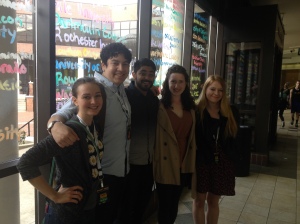My teammates and I spent the afternoon spent watching a haiku slam, a competitive but lighthearted match in which poets deliver dozens of 17-syllable pieces head-to-head. After hearing so much talented writing and concise, powerful language, my fellow poets and I were inspired. My teammates and I joined students from UC Davis’ team and headed to the University Library to talk about our poetry over a cup of coffee, and, as we always do, turn some of what we were experiencing into words on a page. Inspiration at a high, I walked out of the café an hour and half later with the bones of a new poem in my notebook.
The UO Poetry Slam team came to CUPSI with very different poetry to offer the national community. A fellow competitor stopped us in the hallway after a match and said, “I never see poems like this at CUPSI. It’s clear from all of your poems how strong you all are as writers.”
The beauty of a place like CUPSI is that it’s international (now representing teams from Canada and soon to be reaching out to other continents). Poetry was represented at CUPSI from every pocket of the country. Our university’s team poetry tends to be more personal narrative style, which differed a lot from much of the poetry of our competitors’ from the South and the East Coast, whose poetry was more political and advocated for social activism. Without the chance to experience each other’s distinct styles, people grow complacent and fail to see alternatives as viable. As with many societal issues that stem from difference of opinion, what we hold valuable and what we use our poetry to talk about in our homes is different from what other Americans do — and it’s important for us to be exposed to this. The chance to recognize what our peers elsewhere value and how they express themselves is invaluable and inspires new ways we can think about our work.
soon to be reaching out to other continents). Poetry was represented at CUPSI from every pocket of the country. Our university’s team poetry tends to be more personal narrative style, which differed a lot from much of the poetry of our competitors’ from the South and the East Coast, whose poetry was more political and advocated for social activism. Without the chance to experience each other’s distinct styles, people grow complacent and fail to see alternatives as viable. As with many societal issues that stem from difference of opinion, what we hold valuable and what we use our poetry to talk about in our homes is different from what other Americans do — and it’s important for us to be exposed to this. The chance to recognize what our peers elsewhere value and how they express themselves is invaluable and inspires new ways we can think about our work.
National competitions like CUPSI are in many ways the apex of the art form – this IS where slam poetry is being created, showcased, and defined. Many of the coaches, several of whom are professional slam poets in their own rights who have helped shape and pioneer the art, have said here at CUPSI that we as poets are responsible for the space we create. There’s no age limit. There’s no governing board that is regulating our content or our approaches to slam poetry. WE are the culture and community who represents the art, and we must hold ourselves accountable for consciously creating the kind of work we want to foster.
Dialogue like this reaches beyond our campus in Eugene. And the Pacific Northwest. Even the West Coast. Dialogue about the art form happens on a more global scale, and it is crucial that UO was represented at this table.
-Hannah Golden